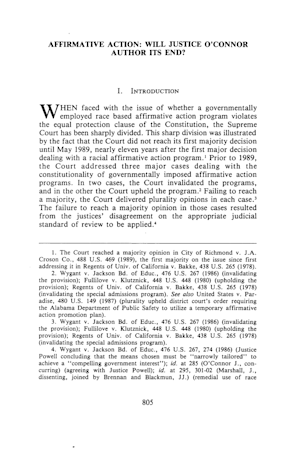Affirmative Action: Will Justice O'Connor Author Its End?
January 1991

DISCLAIMER: This text has been transcribed automatically and may contain substantial inaccuracies due to the limitations of automatic transcription technology. This transcript is intended only to make the content of this document more easily discoverable and searchable. If you would like to quote the exact text of this document in any piece of work or research, please view the original using the link above and gather your quote directly from the source. The Sandra Day O'Connor Institute does not warrant, represent, or guarantee in any way that the text below is accurate.
Article Text
(Excerpt, Automatically generated)
AFFIRMATIVE ACTION: WILL JUSTICE O'CONNOR AUTHOR ITS END?
INTRODUCTION
WHEN faced with the issue of whether a governmentally employed race based affirmative action program violates the equal protection clause of the Constitution, the Supreme Court has been sharply divided. This sharp division was illustrated by the fact that the Court did not reach its first majority decision until May 1989, nearly eleven years after the first major decision dealing with a racial affirmative action program.1 Prior to 1989, the Court addressed three major cases dealing with the constitutionality of governmentally imposed affirmative action programs. In two cases, the Court invalidated the programs, and in the other the Court upheld the program.2 Failing to reach a majority, the Court delivered plurality opinions in each case.3 The failure to reach a majority opinion in those cases resulted from the justices' disagreement on the appropriate judicial standard of review to be applied. 4
The Court reached a majority opinion in City of Richmond v. J.A. Croson Co., 488 U.S. 469 (1989), the first majority on the issue since first addressing it in Regents of Univ. of California v. Bakke, 438 U.S. 265 (1978).
Wygant v. Jackson Bd. of Educ., 476 U.S. 267 (1986) (invalidating the provision); Fullilove v. Klutznick, 448 U.S. 448 (1980) (upholding the provision); Regents of Univ. of California v. Bakke, 438 U.S. 265 (1978) (invalidating the special admissions program). See also United States v. Par
